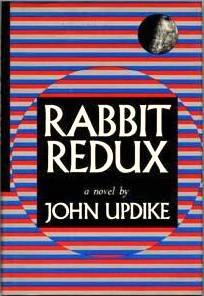Rabbit Redux

First edition
|
|
| Author | John Updike |
|---|---|
| Country | United States |
| Language | English |
| Publisher | Alfred A. Knopf |
|
Publication date
|
1971 |
| Media type | Print (Hardcover and Paperback) |
| Pages | 406 pp |
| ISBN | |
| OCLC | 186352 |
| 813/.5/4 | |
| LC Class | PZ4.U64 Raap 1971 PS3571.P4 |
| Preceded by | Rabbit, Run |
| Followed by | Rabbit is Rich |
Rabbit Redux is a 1971 novel by John Updike. It is the second book in his "Rabbit" series, beginning with Rabbit, Run and followed by Rabbit Is Rich, Rabbit At Rest, published from 1960 to 1990, and the related 2001 novella, Rabbit Remembered.
Rabbit Redux finds former high-school basketball star Harry "Rabbit" Angstrom working a dead-end job (as a Linotype operator at the local printing plant). He is approaching middle age in the declining and fictional city of Brewer, Pennsylvania, the place of his birth. When his wife leaves him for another man, Harry and his thirteen-year-old son are at a loss. He encounters people and events reflecting the state of the nation circa 1969.
Updike's recurring themes of guilt, sex, and death are joined in Redux by racism. Harry plays host to Skeeter, a cynical, drug-dealing African-American Vietnam vet who engages him in debates about the war and race relations. Jill, a wealthy white teenager fleeing suburban Connecticut, enthralls both Harry and his son. The four of them make a scandalous household emblematic of the Summer of Love's most confusing implications. Jill dies in a house fire. Harry and his wife are reconciled at book's end. The plot refers to the background of the historic Apollo 11 moon landing.
Contemporary reviews of the book were generally positive and often glowing. Time Magazine said of the book and its author, "Updike owns a rare verbal genius, a gifted intelligence and a sense of tragedy made bearable by wit. A masterpiece."Anatole Broyard, writing for The New York Times opined, "In "Rabbit Redux," Updike's ear is perfect and he has finally put together in his prose all the things that were there only separately. He has sacrificed none of his sensibility—simply translated it into gutsier, more natural but no less eloquent rhythms. He moves now with the sureness, grace and precision of the born athlete. Let me give you just one random example: Jill's mother—rich, ripe spoiled—feels, when she finds out what happened to her daughter, "a grieved anger seeking its ceiling, a flamingo in her voice seeking the space to flaunt its vivid wings. . ." But enough—for God's sake, read the book. It may even—will probably—change your life."
...
Wikipedia
